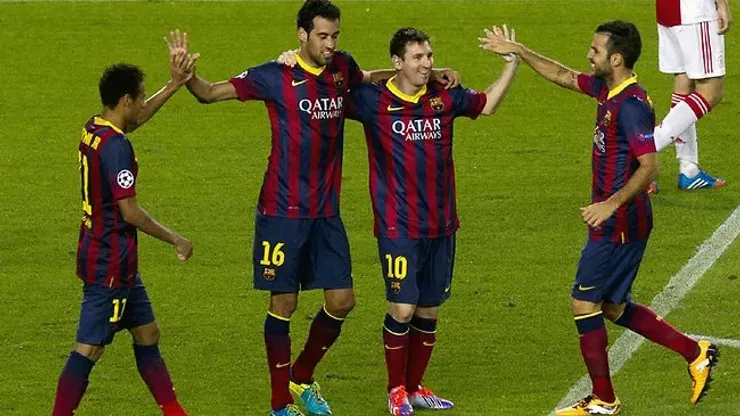“Tika-Taka is dead.”
The phrase was used a lot during the Spaniard’s World Cup campaign. Finishing third in the group, conceding seven and scoring just four left people mourning the style of play called tiki-taka. The style of play is seen as an art-form for the technical lovers of soccer, the short and precise passing, creating space and knowing your surroundings had the soccer enthusiasts worshipping the way they play. However, not everyone saw that style of play to be entertaining; keeping the ball for long periods of play without actually progressing up the pitch is seen as monotonous.
Tiki-taka, in the simplistic terms, means keeping the ball for long periods of time, then waiting for the right time to strike on the opponent; keep the ball, score and repeat. The complex way to explain is that each player has to create a triangle with whomever has the ball, creating triangles throughout the pitch creates multiple options for the player with the ball and is easier to receive it back or go forward; when you have multiple options to push forward it creates more chances which eventually wins matches. Barcelona and Spain are the main users of this tactical way of playing, which have led to a World Cup and European title for Spain and for Barcelona. They won just about everything you can within soccer, multiple times.
However when Barcelona lost the Copa Del Ray final to Real Madrid, followed by coming second to Atletico Madrid and finally losing in the quarter finals to Atletico Madrid in the Champions League, questions started to emerge about whether their style has seen better days and whether the new era of soccer should come through: counter attack.
The way Real Madrid and Atletico Madrid (both Champions League finalists) played last season was the style of counter attack; deploying either a 4-3-3 or 4-2-3-1 the way of playing was to have a solid back line and use the pace in the midfield and wings to destroy their opponent. Both teams beat Barcelona during the 2013/14 season proving there is a way to best tiki-taka.
Spain in the World Cup was a similar story; Holland and Chile both deployed counter attacking tactics against Spain and played brilliantly against the former champion. Like a boxer, both Chile and Holland were underdogs and kept their defense strong until a combination of hits to the champion knocked them off balance; the champion is down but certainly not out.
The reason why tiki-taka did not reign supreme in the World Cup was down to a few things: fatigue was an issue for Spain, the starting eleven against Holland had played a collective total of 465 games, averaging 42 games each. Compare that to Holland (419, averaging 38), Chile (328, averaging 29) and Australia (305, averaging 27) it’s clear to see that no matter what style of soccer you play, you will get tired if you play too much. Eight players in the starting eleven played over 40 games (Cassilas lowered the average down dramatically, playing only 24 times) for their club side, Holland had five, Chile had 3 and Australia had just one, the goalkeeper. Playing that many games will tire out any player, regardless of who you are.
Another issue was the injuries to players suffered throughout the past season; Gerard Pique, Jordi Alba, Diego Costa and Andreas Iniesta all suffered injuries during their club’s seasons, with their eye on the World Cup plus fatigue and lack of match fitness will cause any team to break down.
Barcelona’s downfall last season could be blamed on fatigue, but more importantly that their style of play had been “found out”, being one of the most advertised team over the past five years will take a toll; teams will adapt to how the best team in the World play and try to stop it. It seems as though counter attacking is a weakness of tiki-taka, the high line they play causes players with pace to make problems at the back, adding to the fact a make shift partnership of Mascherano and Pique was used a lot of last season causing cracks to appear.
The future is bright for the two teams, former Barcelona manager Pep Guardiola and his team Bayern Munich implemented the way Barcelona and Spain play last season. The result was winning the league in a record amount of time (seven games to spare) and winning the DFB Pokal shows that the style of play is the right way to play.
A combination of fatigue and injuries had people celebrate the death of tiki-taka, claiming the new era of soccer is here to take over but it turns out that tiki-taka isn’t dead. It was just sleeping.
200+ Channels With Sports & News
- Starting price: $33/mo. for fubo Latino Package
- Watch Premier League, Women’s World Cup, Euro 2024 & Gold Cup
The New Home of MLS
- Price: $14.99/mo. for MLS Season Pass
- Watch every MLS game including playoffs & Leagues Cup
Many Sports & ESPN Originals
- Price: $10.99/mo. (or get ESPN+, Hulu & Disney+ for $14.99/mo.)
- Features Bundesliga, LaLiga, Championship, & FA Cup
2,000+ soccer games per year
- Price: $5.99/mo
- Features Champions League, Serie A, Europa League & Brasileirāo
175 Premier League Games & PL TV
- Starting price: $5.99/mo. for Peacock Premium
- Watch 175 exclusive EPL games per season







